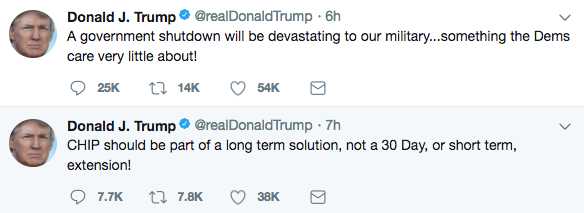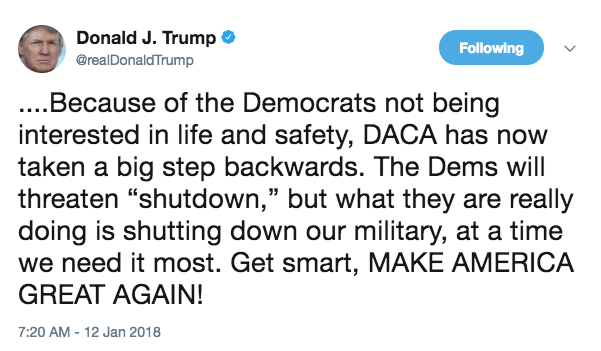As the government faces the threat of another shutdown at midnight on Friday – one where members of the military would be forced to show up for work but not get paid – politicians struggle to propose a stopgap budget that most can agree on.
Approval for funding is stalled in Congress, where Republicans are trying to garner support for a bipartisan agreement while Democrats refuse to budge on immigration issues. Democrats are even refusing to support a short-term funding bill unless it includes their immigration demands, including the Deferred Action Childhood Arrivals (DACA) program, which President Donald Trump recently announced he would end.
In the event of a government shutdown, military service members would be furloughed and paid retroactively whenever normal operations of the government resumed. An extended shutdown can significantly impact the military and other “essential government workers” who will run late on bills and many other obligations.
Right before the 2013 government shutdown, then-President Barack Obama signed the Pay Our Military Act, which made sure that military service members got paid during the shutdown.
Trump told Reuters on Wednesday that the current short-term proposal is “very, very weak” regarding changes to the legal immigration system.
And he tweeted Thursday that CHIP, or the Children’s Health Insurance Plan, shouldn’t be a part of any short-term budget proposal.
“CHIP should be a part of a long term solution, not a 30 Day, or short term, extension,” he tweeted

A government shutdown looms as a budget battle carries on. (Twitter)
One thing almost everyone agrees on is that the military will suffer the most from yet another stopgap budget, one that would only cover a 4-week period.
Trump also tweeted on Thursday that a shutdown would be “devastating” to the military – “something the Dems care very little about,” he wrote.
On Jan. 12, Trump had tweeted: “… Because of the Democrats not being interested in life and safety, DACA has now taken a big step backwards. The Dems will threaten ‘shutdown,’ but what they are really doing is shutting down our military, at a time we need it most.”

A government shutdown looms as a budget battle carries on. (Twitter)
“We are here to support our country’s military,” Trump told reporters at the Pentagon on Thursday. “If the country shuts down, which very well could be, the budget should be handled a lot differently than it has been handled over the last long period of time, many years. But if for any reason it shuts down, the worst thing is what happens to our military.”
“We need that now almost more than at in any time in the past,” Trump added, referring to efforts to rebuild the military.
On Sunday, Trump had said the military would be hurt “badly” by a government shutdown.
“I don’t know if there will be a shutdown. There shouldn’t be, because, if there is, our military gets hurt very badly,” Trump told reporters. “We cannot let our military be hurt.”
On Wednesday, when he appeared on Fox News, Florida Rep. Ron DeSantis criticized Democrats for putting the military’s budget in jeopardy.
“I think it would be absolutely hazardous for Democrats to block funding for our troops, for our military equipment simply because they’re demanding benefits for illegal immigrants,” DeSantis said. “It just shows you that they care more about illegal immigrants than they do about our American military. So I think we should call their bluff. I think a lot will end up folding.”
The military has an unfortunate history of having to deal with stopgap budgets – the Defense Department has been forced to operate under continuing resolutions, or CRs – short-term budgets while a longer-term budget is created – for the past nine years, rather than have an actual yearly budget.
Chairman of the Joint Chiefs of Staff Marine Gen. Joe Dunford said Wednesday that the Defense Department needs “stability and predictability.”
“A CR this year would be below the level of projected funding,” he said. “In other words, the ’18 budget would be a decrease in what the President’s projected budget would be.” This would mean a lower spending level for the military, not to mention that the department would be going four months into fiscal year 2018 at that lower budget.
The current CR runs out at midnight on Friday, Jan. 19.
“This is the ninth straight year with a continuing resolution,” Dunford said. “That lack of predictability and that lack of stability in the budget has not allowed us to most efficiently plan and use the resources available to us.”
Trump in December signed the National Defense Authorization Act (NDAA), which will give the U.S. Military its largest pay raise in seven years, since 2010.
The NDAA calls for a $700 billion Pentagon budget and includes a 2.4-percent pay raise for troops, an increase in the number of troops, and increased spending for aircraft and ships as part of the Fiscal Year 2018 budget.
The NDAA sets the budget but does not provide funding, which Congress must do and is struggling to do. Trump urged Congress to pass legislation that will fund the defense budget in full.
The budget calls for an additional 20,000 troops; funding for weapons systems, retention pay and bonuses; and repairs for Navy ships such as the USS John S. McCain and the USS Fitzgerald, which were both involved in deadly collisions last year.
This is the largest proposed military budget to date, particularly the most significant budget to be passed during the wars in Iraq and Afghanistan.
Congress still has to come up with a definitive plan to fund the $700 billion budget. It has has to approve a defense budget cap increase – the Department of Defense Appropriations Act – in order to accommodate the proposed NDAA. The Act has already been passed in the House.



